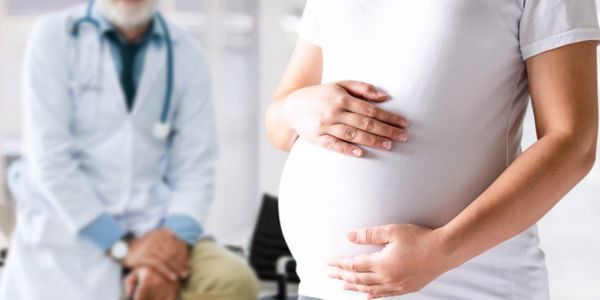Pre-eclampsia is a condition that affects some women during pregnancy. The condition usually occurs after the 20th week of pregnancy.
Most women with pre-eclampsia go on to have healthy babies. But, if left untreated, pre-eclampsia can cause serious health problems for both you and your baby.
What Are the Signs and Symptoms of Pre-eclampsia?
The most common symptoms of pre-eclampsia are high blood pressure (known as hypertension) and the presence of protein in a pregnant woman's urine.
Other Signs and symptoms of pre-eclampsia:
- Changes in vision, like flashing lights, blurred vision, seeing spots of increased sensitivity to light
- A persistent headache
- Nausea, vomiting and dizziness
- Sudden swelling in the hands, feet and face
- Pain below the ribs
It is really important that you seek advice from your midwife or a health professional if you have even just one of the signs or symptoms.
Who Is at Risk of Pre-eclampsia?
Some things may put a woman at a greater risk of developing pre-eclampsia, such as:
- You're pregnant with multiples: twins, triplets and so on
- You've experienced pre-eclampsia in previous pregnancies
- You have high blood pressure outside of pregnancy, diabetes, kidney disease or an autoimmune disease like lupus
Other pre-eclampsia risk factors:
- There is a family history of pre-eclampsia
- It's your first pregnancy
- It's been more than ten years since your last baby
- Having a BMI (body mass index) of 35 or more
- You're 40 or older
- Complications in previous pregnancies; e.g. you gave birth to a baby with low birth weight (less than 5lb 8oz)
What Causes Pre-eclampsia?
Although nobody knows for sure what causes pre-eclampsia, it is thought to occur when there is a problem with the placenta (the organ that links the baby's blood supply to the mother).
Pre-eclampsia Effects on You and Your Baby
As mentioned earlier, without treatment, pre-eclampsia can cause serious health problems for both you and your baby.
Problems for Women With Pre-eclampsia:
- Kidney failure
- Liver failure
- Problems with how your blood clots, leading to severe bleeding or blood clots developing throughout the body
- Stroke
- Eclampsia - A type of convulsion of fit that pregnant women can experience after 20 weeks of pregnancy or in the first 48 hours post-birth
- HELLP syndrome - A rare liver and blood clotting disorder which is likely to occur immediately after birth, but it can occasionally appear after the 20th week of pregnancy
Problems Affecting the Baby:
- Low birth weight
- Pre-term birth - You may have to give birth early to help prevent serious health problems for you and your baby
- Intrauterine growth restriction (IUGR) - The placenta provides food and oxygen to your baby through the umbilical cord - if vessels are narrowed, your baby may not get enough nutrients and oxygen in the womb, which can affect development
How Is Pre-eclampsia Diagnosed?
Your midwife/healthcare professional will check your blood pressure and urine for protein at every antenatal appointment, which is why you must attend all of your antenatal appointments. Some expectant mothers may not know that they have pre-eclampsia!
If you’re between 20 weeks and 36 weeks and six days pregnant and your doctor thinks you may have pre-eclampsia, they may offer you a blood test to rule it out.
This blood test measures the level of PIGF protein (placental growth factor) in your blood. If the levels come back high, you likely have pre-eclampsia. If it comes back low, you may still have pre-eclampsia. However, further tests are needed to confirm.
Pre-eclampsia Treatment
Delivering your baby is the only way pre-eclampsia can be cured. So until this point, if you've been diagnosed, you will be monitored closely until delivery is possible.
Once diagnosed, you’ll be referred for a further assessment and any necessary treatment. You may have to have daily appointments or be admitted to hospital.
Hospital Monitoring
In hospital, you and your baby will be monitored by:
- Having regular urine samples tested to monitor protein levels
- Regular blood pressure checks to identify abnormal increases
- Various blood tests, e.g. to check the health of your liver and kidneys
- Ultrasound scans to check blood flow through the placenta, check the growth of your baby and amniotic fluid levels
- Monitoring baby’s heart rate using CTG (cardiotocography) machines - which will detect any stress or distress in the baby
High Blood Pressure Medication
Medication can be recommended to help lower your blood pressure. The medication reduces the chances of serious complications, such as a stroke.
Delivering Your Baby
If you have pre-eclampsia, giving birth to your baby at 37 or 38 weeks is recommended. Labour may need to be started artificially, or you may need a caesarean section.
Delivering your baby early can reduce the risk of complications from pre-eclampsia. If there are serious concerns about your or your baby's health, earlier delivery may be necessary.
After Delivery
Pre-eclampsia usually improves soon after birth, but complications can sometimes develop in the days after. You may need to stay in hospital to be monitored after the birth.
Your blood pressure will be checked regularly, and medication may be offered if it’s too high. Your baby may also need to be monitored if they were born prematurely.
If you are taking medication, then a doctor’s appointment should be offered two weeks after you’ve transferred from hospital care to your community midwives to check your progress and make adjustments if needed.
You will then have a postnatal check six to eight weeks post-birth with your GP (this is separate from the normal six-week postnatal check) to again check your progress and decide if your treatment can be stopped or needs to continue.







